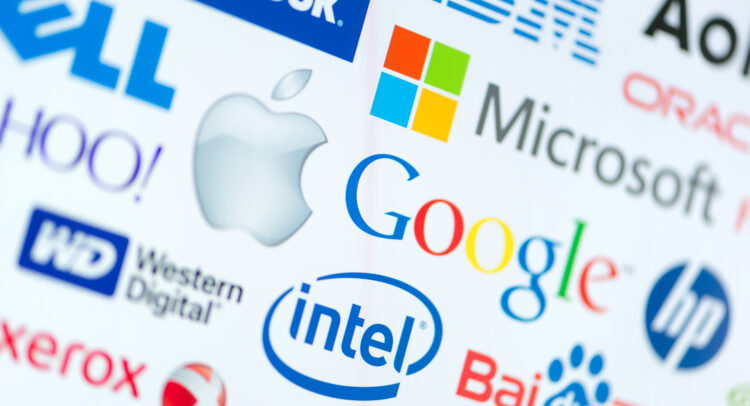Are mega-caps tech stocks about to face economic reality? For the sake of investors in the sector, let’s hope not. Mega-cap tech stocks are priced at P/E ratios nearly 50% above the overall market. This begs the question of whether they are priced correctly. If these stocks are overpriced, investors could face significant losses. This is why the market’s sentiment for the “Magnificent Seven” and other large tech companies is growing more cautious; there’s a genuine concern earnings reports and economic realities may pave the way for an unpleasant earnings season.
Elevate Your Investing Strategy:
- Take advantage of TipRanks Premium at 50% off! Unlock powerful investing tools, advanced data, and expert analyst insights to help you invest with confidence.
Current Valuations and Market Sentiment
Over the past two years, mega-cap tech stocks such as Apple (AAPL), Microsoft (MSFT), Amazon (AMZN), and Alphabet (GOOGL) have seen their P/E ratios soar to a high point when investors were more confident. The confidence has now waned, and the past surge raises concerns about whether these valuations are sustainable. According to LSEG Data Stream, the forward P/E ratio for the S&P 500’s technology sector is 29.5, compared to the broader index’s 19.3. The disparity highlights the market’s high expectations for tech giants, driven by optimism about AI and other digital transformations.
Investors’ Concerns and Economic Indicators
Investors are worried that the above-average valuations may not be justified if growth slows or economic conditions worsen. The recent stumbles in stock prices remind us why more caution could be heeded. For instance, the Federal Reserve’s higher interest rate policy to combat inflation has increased borrowing costs, which creates a drag on consumers and corporate spending. Both are negative for stocks.
Additionally, mixed economic data, such as the latest U.S. GDP growth rate of 2.8% in Q2 2024, shows the Fed may delay any rate cuts, adding uncertainty to the investors’ growing anxiety.
Tech Stock Performance and Earnings Reports
The tech sector’s reports during the last earnings season were mixed. Tesla’s (TSLA) and Alphabet’s (GOOGL) financial results were disappointing, while the S&P 500 (SPX) and Nasdaq Composite (IXIC) inspired their biggest daily losses since 2022 last week. Both indexes remain solidly higher in 2024, up 14.5% and 15.6%, respectively, despite several sharp declines since mid-July.
Market participants are on the edge of their seats as the coming weeks bring earnings reports from Amazon (AMZN), Apple (AAPL), Microsoft (MSFT), and Meta (META). This mass of information has the potential to either shore up a positive sentiment or cause a bigger loss of the tremendous gains these stocks have made in recent years.
Analysts’ Opinions and Market Predictions
Analysts are divided on the future performance of mega-cap tech stocks. Goldman Sachs (GS) maintains a bullish outlook, citing robust demand for cloud services and AI technologies. Countering that is Morgan Stanley (MS), which warns of potential overvaluation, basically saying that the tech sector’s price expectations may not justify its high P/E ratios. According to a recent survey by FactSet, 60% of analysts believe tech stocks are overvalued, while 40% see room for further growth. This bullish versus bearishness reflects the uncertainty of the future strength of these stocks.
Potential Implications for Investors
If mega-cap tech stocks are indeed overpriced, investors could face substantial losses. High valuations mean that even minor disappointments in earnings or economic data could trigger sharp declines in stock prices. Additionally, the potential for a broader index market correction could impact more than just big tech investors. Big technology companies make up a large part of major stock market measures, such as the S&P 500 and Nasdaq. If these tech companies are in a bubble and the bubble bursts, it could harm investors who think they are well-diversified.
Key Takeaways
Mega-cap tech stocks are currently valued nearly 50% higher than historical averages. This raises concerns about potential overvaluation. Investors’ sentiment is mixed, driven by economic uncertainties and recent market turbulence, while inconsistent earnings reports from major tech companies contribute to stock price volatility. Analysts are divided on the future performance of tech stocks, adding to this broader market uncertainty.
Whether these stocks are fairly priced or set for a correction remains to be seen, but the potential for significant market shifts is clear. As we learn about one earnings report at a time, this may unfold during the coming days and weeks.
















